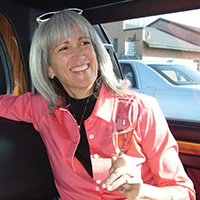By Linda Catoe
Dr. Marlene McCauley, Guilford College Geology Chair
When Dr. Marlene McCauley, Guilford College Geology Chair, pulls the cork on a new semester, she swirls her signature glass of wry humor, insisting, “We will be conducting comparative olfactory evaluations…and not tasting wine.”
The wine course homework does include wine tasting at local wine shops, creating your own tastings, and reporting your findings, but that’s just the homework. As a Geology course, “The Science of Wine” involves studying the geologic history of the planet, different climates, soil composition, tectonics, and other factors that affect grape growing and viticulture around the world.
It was during a Guilford Study Abroad program at Brunnenburg Castle in the Italian Alps that inspired McCauley to introduce the Terroir class at Guilford. Students work in the castle vineyards as part of the course study. Originally, McCauley thought terrain mapping for NC winery prospects could prove helpful research for both Geology students and prospective winery owners.
Realizing that property owners want “sight affirmation, rather than sight suitability reports,” McCauley shaped the Terroir course into a hybrid with field trips to NC wineries, an in-house wine-making lab, and lectures focusing on soil profiles, climatic influences, and geologic events affecting the earth’s major wine-making regions.
Now wrapping up the tenth year in The Science of Wine course, McCauley reflected on an added value of the wine class. I found that more of my former Terroir students say that they keep thinking back to the wine course during and after college. The course helps them get summer jobs starting at higher wages than those summer hires without wine knowledge.” (Her first wine course teaching assistant, Tremain Hatch, has carved out his place in Virginia’s wine-making terrain as Viticulture Research/Extension Associate at Virginia Tech.)
“I think it’s also because students have to take a science lab as a core requirement,” McCauley said. “With wine, students can readily apply their lab experience after college. Wine is always changing, there’s always something to learn about it.”
Speaking of enjoying wine, McCauley was asked to reveal a local vineyard and some of her “around town” wine favorites. She cited Gibsonville’s Grove Winery and Vineyards, located a half-hour drive east of Greensboro. Grove Winery offers wine tastings featuring “European-style” wines including a Nebbiolo wine, the grape used in the acclaimed Barolos and Barabescos from Italy’s Piedmonte region.
“I think it’s fun when NC wineries make a wine that you don’t usually see on other NC restaurant menus,” McCauley said. When visiting wineries and touring the different Triad and Triangle wine trails seem like more trekking than you had in mind, McCauley suggested a few choice places for an in town wine tour.
Although her wine wisdom stretches way beyond the average oenophile’s, McCauley believes that people should drink what they like, personally. “Everyone’s palette is different. And what better way to discover what you like, than to taste a lot of different wines.”


